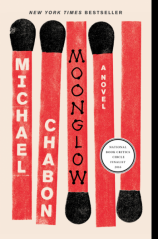Moonglow
Review
Moonglow
Near the middle of Michael Chabon’s MOONGLOW, which is framed as a series of stories told by Chabon’s dying grandfather (known only as “my grandfather”) to Chabon himself, his grandfather offers a remarkable statement about the weight of regret: “All my life, everything I tried, I only got halfway there. You try to take advantage of the time you have. That’s what they tell you to do. But when you’re old, you look back and you see all you did with all that time is waste it. All you have is a story of things you never started or couldn’t finish. Things you fought with all your heart to build that didn’t last or fought with all your heart to get rid of and they’re all still around.” This passage not only sums up a lot of what aging feels like, but also effectively encapsulates several of the themes of the grandfather’s stories as they’re related in Chabon’s account.
"[O]nce readers are willing to surrender to [Chabon's] often lovely prose and discover, along with the author, the stories that comprise a life, reading MOONGLOW is a pure pleasure."
These include more recent stories, such as Chabon’s grandfather’s misadventures stalking an overgrown python he suspects of preying on small pets (including a scrappy cat owned by his new paramour) at his Florida retirement community. There are also stories from earlier in the man’s life, such as his rage-fueled attack on his boss, followed by his incarceration at a minimum-security prison, during which he curries favor with the head warden by designing toy rockets for the warden’s son. And there are powerful, harrowing and occasionally funny wartime stories, ranging from his ill-conceived intentions to prove the ease of a malevolent attack on Washington, DC, to his eventual mission that leads him to the infamous Nordhausen concentration camps. Throughout is woven the enigmatic historical figure of Wernher von Braun, as well as the history of the US space program and its dark and complicated origins in German technology during World War II.
Along the way, we are offered glimpses into the relationship between Chabon’s grandfather and grandmother, as well as his own relationship with his grandmother, who suffered from mental illness during most of his mother’s childhood and whose own secrets form the crux of one of the novel’s central mysteries.
The stories are revealed gradually, intercut with one another and with glimpses of the more present-day interactions between grandfather and grandson. Chabon struggles to make sense of all he’s hearing and, later, how much of the conversations (and subsequent research into his grandmother’s story, in particular) he should reveal to his mother, who herself has not heard all these stories in such detail.
Initially, this intermixing can feel disorienting to the reader, as can Chabon’s intentional blurring of the lines of traditional genres (is this a fictionalized memoir? An autobiographical novel?) and his deliberate avoidance of personal names for all but a handful of characters. His departure from a traditional plot in favor of a more impressionistic encapsulation of memory also takes a while to get used to. But once readers are willing to surrender to his often lovely prose and discover, along with the author, the stories that comprise a life, reading MOONGLOW is a pure pleasure.
During that same conversation, Chabon’s grandfather tells his grandson, “After I’m gone, write it down. Explain everything. Make it mean something. Use a lot of those fancy metaphors of yours. Put the whole thing in proper chronological order, not like this mishmash I’m making you.” In the end, no one but Chabon will ever really know where history and memory end and fiction and metaphor begin in these pages. But at some point it ceases to matter, as those questions are outweighed by the value of these stories, which are so beautifully told.
Reviewed by Norah Piehl on November 22, 2016
Moonglow
- Publication Date: September 19, 2017
- Genres: Fiction
- Paperback: 480 pages
- Publisher: Harper Perennial
- ISBN-10: 0062225561
- ISBN-13: 9780062225566





